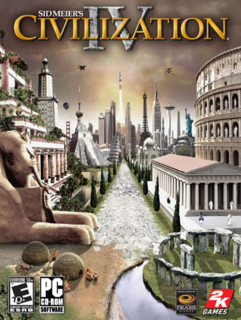There's quite a lot of mechanics to learn in Civilization IV, and so takes a while to understand the strategy. It's been a while since I've played Civilization Revolution and Civilization III, but I recall the general idea of forming cities, maintaining diplomacy, building an army, acquiring resources and expanding science and culture.
There is a "Tutorial" option which I think does a bit better than the previous game but you will need lots of practice to fully understand the mechanics. There is a "Civipedia" which has information on all the concepts in the game, so you will need to keep going to this to read it.
This is a turn based game and you move over a hex-based grid. Your city can access the surrounding tiles to acquire the resources, and the range expands as your population grows. You need Food for growth, Production to produce units, Money for maintenance, and your city can grow in Culture which expands your borders. The border is your national boundary, so only allies can pass through when you have the “Open Border” agreement. Otherwise, entering another Civilization’s borders declares war.
Tiles can be upgraded in some way such as building a road, mine, or irrigating it. You need to build lots of roads and make sure your towns are connected. Not only does this allow you to move troops quickly to help defend them, it allows you to share certain resources.
Although you would assume you will be fighting a lot, you are discouraged by the fact that your citizens can become happy and revolt; temporarily ceasing production. When you take over cities, the residents are partly from the original civilization, which means they will be unhappy whenever you are at war with their country. It seemed beneficial to steal a few towns, then offer a peace treaty, so you can grow in terms of the number of cities, but then allow your new cities to grow further.
When negotiating peace, the stronger you are, the more negotiating power you have. So you can get them to throw in extra gold, technology or even small cities. The AI will offer to trade with you when you are at peace, usually wanting your better technology. I normally liked keeping the upper hand here, but sometimes I accepted if I can trade multiple technologies for one.
When fighting, there's some random elements involved plus stats of the units and extra bonuses based on the tile. Some units are designed for attack, defence or bombard. When your unit is victorious, they acquire experience and can level up. Units in cities gain a defensive bonus, as do units that you instruct to Fortify, which over time, will give you a bonus up to 25%. When units occupy the same tile, attacking them automatically selects the best unit to defend (so if you attack with cavalry and there is a swordsman and a pikeman on the tile, you will attack the pikeman); so the aggressor never has the upper hand. These aspects mean it is really difficult to take cities.
You start off in BC, but as the turns progress, you move through the ages like medieval times, industrial, up to the present day. It's interesting to have basic warriors and catapults, then several hours later have infantry and tanks.
Notice that I wrote “several hours”. This game is a lot like the Total War series. So be prepared to spend more than 10 hours on a single game. There's lots of civilizations to take control of, but I'd imagine most people won't see many of them due to how long each game takes.

